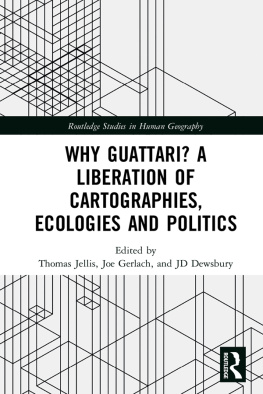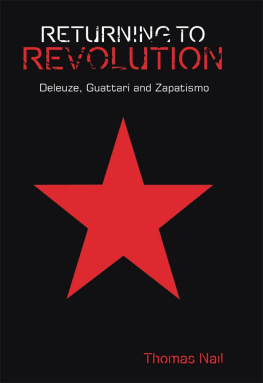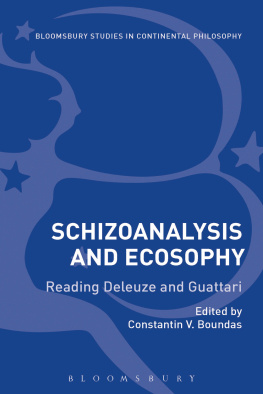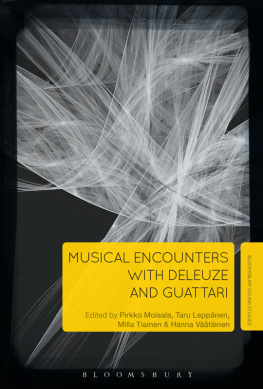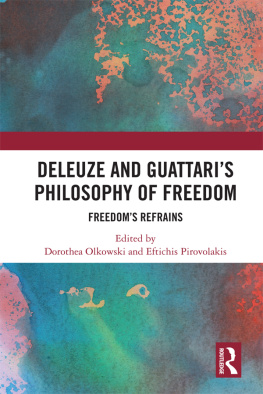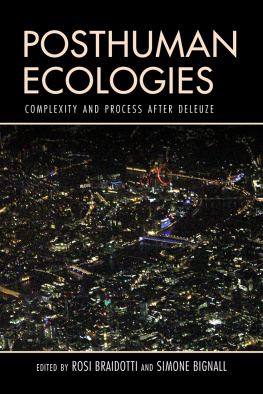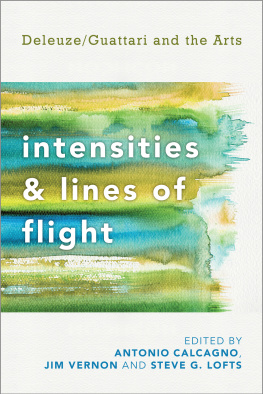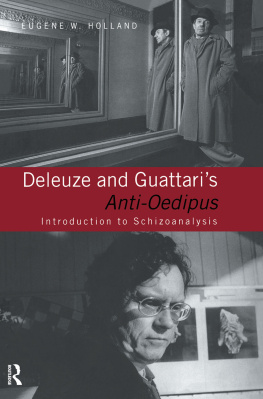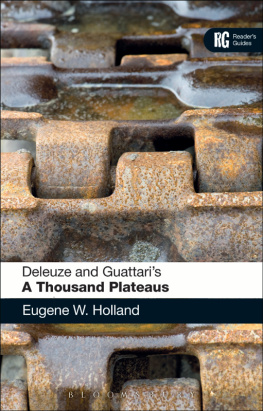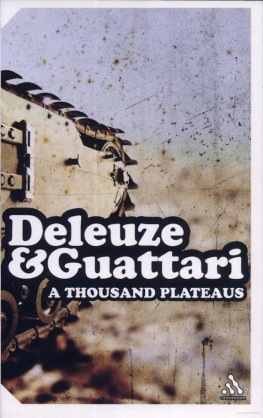Why Guattari? A Liberation of Cartographies, Ecologies and Politics
This book examines Flix Guattari, the French psychoanalyst, philosopher, and radical activist, renowned for an energetic style of thought that cuts across conceptual, political, and institutional spheres.
Increasingly recognised as a key figure in his own right, Guattaris influence in contemporary social theory and the modern social sciences continues to grow. From the ecosophy of hurricanes to the micropolitics of cinema, the book draws together a series of Guattarian motifs which animate the complexity of one of the twentieth centurys greatest and enigmatic thinkers. The book examines techniques and modes of thought that contribute to a liberation of thinking and subjectivity. Divided thematically into three parts cartographies, ecologies, and micropolitics each chapter showcases the singular and pragmatic grounds by which Guattaris signature concepts can be found to be both disruptive to traditional modes of thinking, and generative toward novel forms of ethics, politics, and sociality.
This interdisciplinary compendium on Guattaris exciting, experimental, and enigmatic thought will appeal to academics and postgraduates within Social Theory, Human Geography, and Continental Philosophy.
Thomas Jellis is a British Academy Postdoctoral Fellow at the School of Geography and the Environment at the University of Oxford, and a Research Fellow at Keble College.
Joe Gerlach is Lecturer of Human Geography at the School of Geographical Sciences, University of Bristol.
JD Dewsbury is Professor of Human Geography at the University of New South Wales, Canberra, Australia.
Routledge Studies in Human Geography
This series provides a forum for innovative, vibrant, and critical debate within Human Geography. Titles will reflect the wealth of research which is taking place in this diverse and ever-expanding field. Contributions will be drawn from the main sub-disciplines and from innovative areas of work which have no particular sub-disciplinary allegiances.
Living with the Sea
Knowledge, Awareness and Action
Edited by Mike Brown and Kimberley Peters
Time Geography in the Global Context
An Anthology
Edited by Kajsa Ellegrd
Consolationscapes in the Face of Loss
Grief and Consolation in Space and Time
Edited by Christoph Jedan, Avril Maddrell and Eric Venbrux
The Crisis of Global Youth Unemployment
Edited by Tamar Mayer, Sujata Moorti and Jamie K. McCallum
Thinking Time Geography
Concepts, Methods and Applications
Kajsa Ellegrd
British Migration
Globalisation, Transnational Identities and Multiculturalism
Edited by Pauline Leonard and Katie Walsh
Why Guattari? A Liberation of Cartographies, Ecologies and Politics
Edited by Thomas Jellis, Joe Gerlach, and JD Dewsbury
For more information about this series, please visit: www.routledge.com/Routledge-Studies-in-Human-Geography/book-series/SE0514
Why Guattari? A Liberation of Cartographies, Ecologies and Politics
Edited by Thomas Jellis, Joe Gerlach, and JD Dewsbury

First published 2019
by Routledge
2 Park Square, Milton Park, Abingdon, Oxon OX14 4RN
and by Routledge
52 Vanderbilt Avenue, New York, NY 10017
Routledge is an imprint of the Taylor & Francis Group, an informa business
2019 selection and editorial matter, Thomas Jellis, Joe Gerlach, and JD Dewsbury; individual chapters, the contributors.
The right of Thomas Jellis, Joe Gerlach, and JD Dewsbury to be identified as the authors of the editorial material, and of the authors for their individual chapters, has been asserted in accordance with sections 77 and 78 of the Copyright, Designs and Patents Act 1988.
All rights reserved. No part of this book may be reprinted or reproduced or utilised in any form or by any electronic, mechanical, or other means, now known or hereafter invented, including photocopying and recording, or in any information storage or retrieval system, without permission in writing from the publishers.
Trademark notice: Product or corporate names may be trademarks or registered trademarks, and are used only for identification and explanation without intent to infringe.
British Library Cataloguing-in-Publication Data
A catalogue record for this book is available from the British Library
Library of Congress Cataloging-in-Publication Data
A catalog record for this book has been requested
ISBN: 978-1-138-18349-0 (hbk)
ISBN: 978-1-315-64582-7 (ebk)
Typeset in Times New Roman
by Apex CoVantage, LLC
Contents
GARY GENOSKO
THOMAS JELLIS, JOE GERLACH, AND JD DEWSBURY
Part I
Cartographies
MARCUS A. DOEL AND DAVID B. CLARKE
MANOLA ANTONIOLI
TOM ROBERTS
CHRISTOPH BRUNNER
ANNE QUERRIEN
JD DEWSBURY
Part II
Ecologies
MARIA HYNES
MAHORO MURASAWA AND STPHANE NADAUD
MICHELE LANCIONE
REBECCA CATARELLI
SASHA ENGELMANN
Part III
Micropolitics
THOMAS JELLIS AND JOE GERLACH
ANDREW LAPWORTH
NINA WILLIAMS
ARUN SALDANHA
ANJA KANNGIESER
Manola Antonioli holds a PhD in Philosophy and the Social Sciences from EHESS (Paris) and previously oversaw the seminar series at the Collge International de Philosophie. She currently teaches the philosophy of architecture and urban studies at the Ecole Nationale Suprieure dArchitecture of Paris, La Villette. She has recently edited four books: Thories et pratiques cologiques (Presses Universitaires de Paris Ouest, 2013); Paysage variations (ditions Loco, 2014); Machines de guerre urbaines (ditions Loco, 2015); and Biomimtisme (ditions Loco, 2017).
Christoph Brunner is Assistant Professor for Cultural Theory at Leuphana University Luneburg. In his research he deals with the relations between art, media, and activism investigating the aesthetic politics of social movements, in particular. He is director of the ArchipelagoLab for Transversal Practices, member of the SenseLab Montreal, and part of the European Institute for Progressive Cultural Policies (eipcp) and co-editor of transversal texts. He has published in Third Text, Conjunctions, Inflexions, Open!, and Fibreculture, among others.
Rebecca Catarelli is currently serving as Chief Operating Officer at Marlboro College, an experimental liberal arts institution in Vermont, USA, committed to helping undergraduate students pursue self-designed study that emphasises interdisciplinarity and individual expression. Having transitioned to the administrative side of academia several years ago, this will likely be her only publication of this type, which makes her feel both wistful and relieved. Rebecca continues to write experimentally and is currently working on a book that considers the instability of truth and experience through a narrative entwining motherhood, generational trauma, and the enigmatic nature of giant squid.
David B. Clarke is Professor of Human Geography and at Swansea University, where he previously served as Head of Department (20152018). He is a Co-director of the Centre for Urban Theory. His substantive research interests include work on cities, cinema, consumer culture, and value. He is the author of The Consumer Society and the Postmodern City

